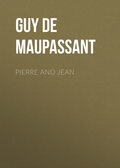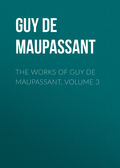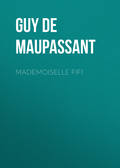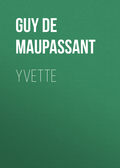
Ги де Мопассан
Original Short Stories – Volume 08
THE ORPHAN
Mademoiselle Source had adopted this boy under very sad circumstances. She was at the time thirty-six years old. Being disfigured through having as a child slipped off her nurse’s lap into the fireplace and burned her face shockingly, she had determined not to marry, for she did not want any man to marry her for her money.
A neighbor of hers, left a widow just before her child was born, died in giving birth, without leaving a sou. Mademoiselle Source took the new-born child, put him out to nurse, reared him, sent him to a boarding-school, then brought him home in his fourteenth year, in order to have in her empty house somebody who would love her, who would look after her, and make her old age pleasant.
She had a little country place four leagues from Rennes, and she now dispensed with a servant; her expenses having increased to more than double since this orphan’s arrival, her income of three thousand francs was no longer sufficient to support three persons.
She attended to the housekeeping and cooking herself, and sent out the boy on errands, letting him also occupy himself in cultivating the garden. He was gentle, timid, silent, and affectionate. And she experienced a deep happiness, a fresh happiness when he kissed her without surprise or horror at her disfigurement. He called her “Aunt,” and treated her as a mother.
In the evening they both sat down at the fireside, and she made nice little dainties for him. She heated some wine and toasted a slice of bread, and it made a charming little meal before going to bed. She often took him on her knees and covered him with kisses, murmuring tender words in his ear. She called him: “My little flower, my cherub, my adored angel, my divine jewel.” He softly accepted her caresses, hiding his head on the old maid’s shoulder. Although he was now nearly fifteen, he had remained small and weak, and had a rather sickly appearance.
Sometimes Mademoiselle Source took him to the city, to see two married female relatives of hers, distant cousins, who were living in the suburbs, and who were the only members of her family in existence. The two women had always found fault with her, for having adopted this boy, on account of the inheritance; but for all that, they gave her a cordial welcome, having still hopes of getting a share for themselves, a third, no doubt, if what she possessed were only equally divided.
She was happy, very happy, always occupied with her adopted child. She bought books for him to improve his mind, and he became passionately fond of reading.
He no longer climbed on her knee to pet her as he had formerly done; but, instead, would go and sit down in his little chair in the chimney-corner and open a volume. The lamp placed at the edge of the Tittle table above his head shone on his curly hair, and on a portion of his forehead; he did not move, he did not raise his eyes or make any gesture. He read on, interested, entirely absorbed in the story he was reading.
Seated opposite to him, she would gaze at him earnestly, astonished at his studiousness, often on the point of bursting into tears.
She said to him occasionally: “You will fatigue yourself, my treasure!” hoping that he would raise his head, and come across to embrace her; but he did not even answer her; he had not heard or understood what she was saying; he paid no attention to anything save what he read in those pages.
For two years he devoured an incalculable number of volumes. His character changed.
After this, he asked Mademoiselle Source several times for money, which she gave him. As he always wanted more, she ended by refusing, for she was both methodical and decided, and knew how to act rationally when it was necessary to do so. By dint of entreaties he obtained a large sum from her one night; but when he begged her for more a few days later, she showed herself inflexible, and did not give way to him further, in fact.
He appeared to be satisfied with her decision.
He again became quiet, as he had formerly been, remaining seated for entire hours, without moving, plunged in deep reverie. He now did not even talk to Madame Source, merely answering her remarks with short, formal words. Nevertheless, he was agreeable and attentive in his manner toward her; but he never embraced her now.
She had by this time grown slightly afraid of him when they sat facing one another at night on opposite sides of the fireplace. She wanted to wake him up, to make him say something, no matter what, that would break this dreadful silence, which was like the darkness of a wood. But he did not appear to listen to her, and she shuddered with the terror of a poor feeble woman when she had spoken to him five or six times successively without being able to get a word out of him.
What was the matter with him? What was going on in that closed-up head? When she had remained thus two or three hours opposite him, she felt as if she were going insane, and longed to rush away and to escape into the open country in order to avoid that mute, eternal companionship and also some vague danger, which she could not define, but of which she had a presentiment.
She frequently wept when she was alone. What was the matter with him? When she expressed a wish, he unmurmuringly carried it into execution. When she wanted anything brought from the city, he immediately went there to procure it. She had no complaint to make of him; no, indeed! And yet —
Another year flitted by, and it seemed to her that a fresh change had taken place in the mind of the young man. She perceived it; she felt it; she divined it. How? No matter! She was sure she was not mistaken; but she could not have explained in what manner the unknown thoughts of this strange youth had changed.
It seemed to her that, until now, he had been like a person in a hesitating frame of mind, who had suddenly arrived at a determination. This idea came to her one evening as she met his glance, a fixed, singular glance which she had not seen in his face before.
Then he commenced to watch her incessantly, and she wished she could hide herself in order to avoid that cold eye riveted on her.
He kept staring at her, evening after evening, for hours together, only averting his eyes when she said, utterly unnerved:
“Do not look at me like that, my child!”
Then he would lower his head.
But the moment her back was turned she once more felt that his eyes were upon her. Wherever she went, he pursued her with his persistent gaze.
Sometimes, when she was walking in her little garden, she suddenly noticed him hidden behind a bush, as if he were lying in wait for her; and, again, when she sat in front of the house mending stockings while he was digging some vegetable bed, he kept continually watching her in a surreptitious manner, as he worked.
It was in vain that she asked him:
“What’s the matter with you, my boy? For the last three years, you have become very different. I don’t recognize you. Do tell me what ails you, and what you are thinking of.”
He invariably replied, in a quiet, weary tone:
“Why, nothing ails me, aunt!”
And when she persisted:
“Ah! my child, answer me, answer me when I speak to you. If you knew what grief you caused me, you would always answer, and you would not look at me that way. Have you any trouble? Tell me! I’ll comfort you!”
He went away, with a tired air, murmuring:
“But there is nothing the matter with me, I assure you.”
He had not grown much, having always a childish look, although his features were those of a man. They were, however, hard and badly cut. He seemed incomplete, abortive, only half finished, and disquieting as a mystery. He was a self-contained, unapproachable being, in whom there seemed always to be some active, dangerous mental labor going on. Mademoiselle Source was quite conscious of all this, and she could not sleep at night, so great was her anxiety. Frightful terrors, dreadful nightmares assailed her. She shut herself up in her own room, and barricaded the door, tortured by fear.
What was she afraid of? She could not tell.
She feared everything, the night, the walls, the shadows thrown by the moon on the white curtains of the windows, and, above all, she feared him.
Why?
What had she to fear? Did she know what it was?
She could live this way no longer! She felt certain that a misfortune threatened her, a frightful misfortune.
She set forth secretly one morning, and went into the city to see her relatives. She told them about the matter in a gasping voice. The two women thought she was going mad and tried to reassure her.
She said:
“If you knew the way he looks at me from morning till night. He never takes his eyes off me! At times, I feel a longing to cry for help, to call in the neighbors, so much am I afraid. But what could I say to them? He does nothing but look at me.”
The two female cousins asked:
“Is he ever brutal to you? Does he give you sharp answers?”
She replied:
“No, never; he does everything I wish; he works hard: he is steady; but I am so frightened that I care nothing for that. He is planning something, I am certain of that – quite certain. I don’t care to remain all alone like that with him in the country.”
The relatives, astonished at her words, declared that people would be amazed, would not understand; and they advised her to keep silent about her fears and her plans, without, however, dissuading her from coming to reside in the city, hoping in that way that the entire inheritance would eventually fall into their hands.
They even promised to assist her in selling her house, and in finding another, near them.
Mademoiselle Source returned home. But her mind was so much upset that she trembled at the slightest noise, and her hands shook whenever any trifling disturbance agitated her.
Twice she went again to consult her relatives, quite determined now not to remain any longer in this way in her lonely dwelling. At last, she found a little cottage in the suburbs, which suited her, and she privately bought it.
The signature of the contract took place on a Tuesday morning, and Mademoiselle Source devoted the rest of the day to the preparations for her change of residence.
At eight o’clock in the evening she got into the diligence which passed within a few hundred yards of her house, and she told the conductor to put her down in the place where she usually alighted. The man called out to her as he whipped his horses:
“Good evening, Mademoiselle Source – good night!”
She replied as she walked on:
“Good evening, Pere Joseph.” Next morning, at half-past seven, the postman who conveyed letters to the village noticed at the cross-road, not far from the high road, a large splash of blood not yet dry. He said to himself: “Hallo! some boozer must have had a nose bleed.”
But he perceived ten paces farther on a pocket handkerchief also stained with blood. He picked it up. The linen was fine, and the postman, in alarm, made his way over to the ditch, where he fancied he saw a strange object.
Mademoiselle Source was lying at the bottom on the grass, her throat cut with a knife.
An hour later, the gendarmes, the examining magistrate, and other authorities made an inquiry as to the cause of death.
The two female relatives, called as witnesses, told all about the old maid’s fears and her last plans.
The orphan was arrested. After the death of the woman who had adopted him, he wept from morning till night, plunged, at least to all appearance, in the most violent grief.
He proved that he had spent the evening up to eleven o’clock in a cafe. Ten persons had seen him, having remained there till his departure.
The driver of the diligence stated that he had set down the murdered woman on the road between half-past nine and ten o’clock.
The accused was acquitted. A will, drawn up a long time before, which had been left in the hands of a notary in Rennes, made him sole heir. So he inherited everything.
For a long time, the people of the country boycotted him, as they still suspected him. His house, that of the dead woman, was looked upon as accursed. People avoided him in the street.
But he showed himself so good-natured, so open, so familiar, that gradually these horrible doubts were forgotten. He was generous, obliging, ready to talk to the humblest about anything, as long as they cared to talk to him.
The notary, Maitre Rameau, was one of the first to take his part, attracted by his smiling loquacity. He said at a dinner, at the tax collector’s house:
“A man who speaks with such facility and who is always in good humor could not have such a crime on his conscience.”
Touched by his argument, the others who were present reflected, and they recalled to mind the long conversations with this man who would almost compel them to stop at the road corners to listen to his ideas, who insisted on their going into his house when they were passing by his garden, who could crack a joke better than the lieutenant of the gendarmes himself, and who possessed such contagious gaiety that, in spite of the repugnance with which he inspired them, they could not keep from always laughing in his company.
All doors were opened to him after a time.
He is to-day the mayor of his township.
THE BEGGAR
He had seen better days, despite his present misery and infirmities
At the age of fifteen both his legs had been crushed by a carriage on the Varville highway. From that time forth he begged, dragging himself along the roads and through the farmyards, supported by crutches which forced his shoulders up to his ears. His head looked as if it were squeezed in between two mountains.
A foundling, picked up out of a ditch by the priest of Les Billettes on the eve of All Saints’ Day and baptized, for that reason, Nicholas Toussaint, reared by charity, utterly without education, crippled in consequence of having drunk several glasses of brandy given him by the baker (such a funny story!) and a vagabond all his life afterward – the only thing he knew how to do was to hold out his hand for alms.
At one time the Baroness d’Avary allowed him to sleep in a kind of recess spread with straw, close to the poultry yard in the farm adjoining the chateau, and if he was in great need he was sure of getting a glass of cider and a crust of bread in the kitchen. Moreover, the old lady often threw him a few pennies from her window. But she was dead now.
In the villages people gave him scarcely anything – he was too well known. Everybody had grown tired of seeing him, day after day for forty years, dragging his deformed and tattered person from door to door on his wooden crutches. But he could not make up his mind to go elsewhere, because he knew no place on earth but this particular corner of the country, these three or four villages where he had spent the whole of his miserable existence. He had limited his begging operations and would not for worlds have passed his accustomed bounds.
He did not even know whether the world extended for any distance beyond the trees which had always bounded his vision. He did not ask himself the question. And when the peasants, tired of constantly meeting him in their fields or along their lanes, exclaimed: “Why don’t you go to other villages instead of always limping about here?” he did not answer, but slunk away, possessed with a vague dread of the unknown – the dread of a poor wretch who fears confusedly a thousand things – new faces, taunts, insults, the suspicious glances of people who do not know him and the policemen walking in couples on the roads. These last he always instinctively avoided, taking refuge in the bushes or behind heaps of stones when he saw them coming.
When he perceived them in the distance, ‘With uniforms gleaming in the sun, he was suddenly possessed with unwonted agility – the agility of a wild animal seeking its lair. He threw aside his crutches, fell to the ground like a limp rag, made himself as small as possible and crouched like a bare under cover, his tattered vestments blending in hue with the earth on which he cowered.
He had never had any trouble with the police, but the instinct to avoid them was in his blood. He seemed to have inherited it from the parents he had never known.
He had no refuge, no roof for his head, no shelter of any kind. In summer he slept out of doors and in winter he showed remarkable skill in slipping unperceived into barns and stables. He always decamped before his presence could be discovered. He knew all the holes through which one could creep into farm buildings, and the handling of his crutches having made his arms surprisingly muscular he often hauled himself up through sheer strength of wrist into hay-lofts, where he sometimes remained for four or five days at a time, provided he had collected a sufficient store of food beforehand.
He lived like the beasts of the field. He was in the midst of men, yet knew no one, loved no one, exciting in the breasts of the peasants only a sort of careless contempt and smoldering hostility. They nicknamed him “Bell,” because he hung between his two crutches like a church bell between its supports.
For two days he had eaten nothing. No one gave him anything now. Every one’s patience was exhausted. Women shouted to him from their doorsteps when they saw him coming:
“Be off with you, you good-for-nothing vagabond! Why, I gave you a piece of bread only three days ago!”
And he turned on his crutches to the next house, where he was received in the same fashion.
The women declared to one another as they stood at their doors:
“We can’t feed that lazy brute all the year round!”
And yet the “lazy brute” needed food every day.
He had exhausted Saint-Hilaire, Varville and Les Billettes without getting a single copper or so much as a dry crust. His only hope was in Tournolles, but to reach this place he would have to walk five miles along the highroad, and he felt so weary that he could hardly drag himself another yard. His stomach and his pocket were equally empty, but he started on his way.
It was December and a cold wind blew over the fields and whistled through the bare branches of the trees; the clouds careered madly across the black, threatening sky. The cripple dragged himself slowly along, raising one crutch after the other with a painful effort, propping himself on the one distorted leg which remained to him.
Now and then he sat down beside a ditch for a few moments’ rest. Hunger was gnawing his vitals, and in his confused, slow-working mind he had only one idea-to eat-but how this was to be accomplished he did not know. For three hours he continued his painful journey. Then at last the sight of the trees of the village inspired him with new energy.
The first peasant he met, and of whom he asked alms, replied:
“So it’s you again, is it, you old scamp? Shall I never be rid of you?”
And “Bell” went on his way. At every door he got nothing but hard words. He made the round of the whole village, but received not a halfpenny for his pains.
Then he visited the neighboring farms, toiling through the muddy land, so exhausted that he could hardly raise his crutches from the ground. He met with the same reception everywhere. It was one of those cold, bleak days, when the heart is frozen and the temper irritable, and hands do not open either to give money or food.
When he had visited all the houses he knew, “Bell” sank down in the corner of a ditch running across Chiquet’s farmyard. Letting his crutches slip to the ground, he remained motionless, tortured by hunger, but hardly intelligent enough to realize to the full his unutterable misery.
He awaited he knew not what, possessed with that vague hope which persists in the human heart in spite of everything. He awaited in the corner of the farmyard in the biting December wind, some mysterious aid from Heaven or from men, without the least idea whence it was to arrive. A number of black hens ran hither and thither, seeking their food in the earth which supports all living things. Ever now and then they snapped up in their beaks a grain of corn or a tiny insect; then they continued their slow, sure search for nutriment.
“Bell” watched them at first without thinking of anything. Then a thought occurred rather to his stomach than to his mind – the thought that one of those fowls would be good to eat if it were cooked over a fire of dead wood.
He did not reflect that he was going to commit a theft. He took up a stone which lay within reach, and, being of skillful aim, killed at the first shot the fowl nearest to him. The bird fell on its side, flapping its wings. The others fled wildly hither and thither, and “Bell,” picking up his crutches, limped across to where his victim lay.
Just as he reached the little black body with its crimsoned head he received a violent blow in his back which made him let go his hold of his crutches and sent him flying ten paces distant. And Farmer Chiquet, beside himself with rage, cuffed and kicked the marauder with all the fury of a plundered peasant as “Bell” lay defenceless before him.
The farm hands came up also and joined their master in cuffing the lame beggar. Then when they were tired of beating him they carried him off and shut him up in the woodshed, while they went to fetch the police.
“Bell,” half dead, bleeding and perishing with hunger, lay on the floor. Evening came – then night – then dawn. And still he had not eaten.
About midday the police arrived. They opened the door of the woodshed with the utmost precaution, fearing resistance on the beggar’s part, for Farmer Chiquet asserted that he had been attacked by him and had had great, difficulty in defending himself.
The sergeant cried:
“Come, get up!”
But “Bell” could not move. He did his best to raise himself on his crutches, but without success. The police, thinking his weakness feigned, pulled him up by main force and set him between the crutches.
Fear seized him – his native fear of a uniform, the fear of the game in presence of the sportsman, the fear of a mouse for a cat-and by the exercise of almost superhuman effort he succeeded in remaining upright.
“Forward!” said the sergeant. He walked. All the inmates of the farm watched his departure. The women shook their fists at him the men scoffed at and insulted him. He was taken at last! Good riddance! He went off between his two guards. He mustered sufficient energy – the energy of despair – to drag himself along until the evening, too dazed to know what was happening to him, too frightened to understand.
People whom he met on the road stopped to watch him go by and peasants muttered:
“It’s some thief or other.”
Toward evening he reached the country town. He had never been so far before. He did not realize in the least what he was there for or what was to become of him. All the terrible and unexpected events of the last two days, all these unfamiliar faces and houses struck dismay into his heart.
He said not a word, having nothing to say because he understood nothing. Besides, he had spoken to no one for so many years past that he had almost lost the use of his tongue, and his thoughts were too indeterminate to be put into words.
He was shut up in the town jail. It did not occur to the police that he might need food, and he was left alone until the following day. But when in the early morning they came to examine him he was found dead on the floor. Such an astonishing thing!







